
6 perennials to grow on a windy balcony
Of plants as beautiful as they are resilient, for pot or container cultivation.
Contents
On a a balcony or terrace in a windy location, plants are subjected to particular conditions: strong, cold, drying winds or salty water-laden spray can impact the growth and health of the more sensitive ones.
However, it is not necessary to give up growing plants or flowers on a windy balcony. Among perennials, many robust, dwarf or modest-sized species and varieties, naturally reducing their exposure to the wind, will adapt very well.
Of course, these perennials will be perfectly suited for cultivation in pots, window boxes or containers. Just choose heavy and stable containers to withstand the onslaught of the wind.
Here is our selection of 7 perennials that are not afraid of gusts for your balcony or terrace.
Heather, a regular in windy areas
The Heather is naturally found in habitats exposed to strong cold or dry winds, as well as sea spray, such as heathland or Scotland. Therefore, they will have no trouble adapting to a windy balcony or terrace.
These evergreen undershrubs offer a delightful bell-shaped flowering, typically in pink or white. Winter heathers (Erica x darleyensis ‘Ghost Hills’, ‘White Perfection’, Erica carnea ‘Jenny Porter’, …) bloom during the cold season, brightening the garden at a time when most plants are in dormancy. Other varieties (Calluna vulgaris ‘Marlies’, ‘Alba’, ‘Silver Knight’, ‘H.E Beale’…) flower in spring or summer, so by combining them, you can enjoy staggered flowering for almost the entire year.
Their small silhouettes also make them easy to grow in pots or containers. Classic varieties typically measure only 30 to 50 cm in height. Their creeping habit is perfectly suited for planters or beautiful bowls to adorn the balcony.
Resistant to even difficult conditions, tolerant of pollution, hardy generally down to -20°C, minimally susceptible to diseases, and almost maintenance-free: heather is a very easy perennial to grow.
Provide it with a sunny or partially shaded location, in rather acidic and very well-drained soil.
For more information, our articles “Heathers: planting, pruning, and maintaining” and “How to grow heather in a pot?” are available for you.
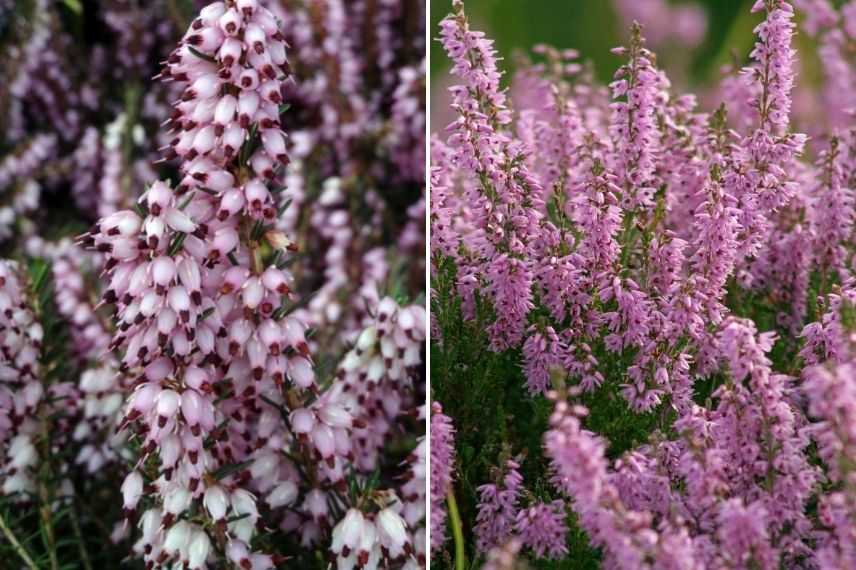
Erica darleyensis ‘Ghost Hills’ and Calluna vulgaris ‘H.E Beale’
Miscanthus, a grass used as a windbreak
Miscanthus are grasses from Asia, highly valued for their graphic, light, and structured foliage. They fit into all garden styles, bringing a modern, wild, and exotic touch. In the wind, stems and leaves undulate, creating a soft and pleasant rustling sound. A true natural stress reliever!
The flowering in feathery spikelets, equally charming, occurs in late summer or early autumn, in shades of pink, red, or silver, depending on the varieties.
For planting on a balcony, choose the smaller, even dwarf varieties that will adapt to all types of containers:
- the Miscanthus sinensis ‘Little Zebra’ (80 cm tall and 50 cm wide), with dark green foliage striped with yellow-cream;
- ‘Kleine Silberspinne’ (1 metre tall and 50 cm wide), a dwarf variety with green leaves that become vibrant in autumn;
- ‘Gold Bar’ (80 cm tall and 40 cm wide), with ribbon-like leaves striped with gold;
- ‘Cute One’, one of the most compact and smallest Chinese reeds (50 cm tall and 40 cm wide).
Low-maintenance, hardy, and tolerant of wind and salt spray, it is an easy-going plant. It is also used for its qualities and resilience in windbreak and privacy hedges.
Miscanthus will thrive in sunny or partially shaded locations. The deciduous foliage will only need to be pruned at the end of winter.
For further reading, discover our guide “Miscanthus: planting, growing, and caring for.”
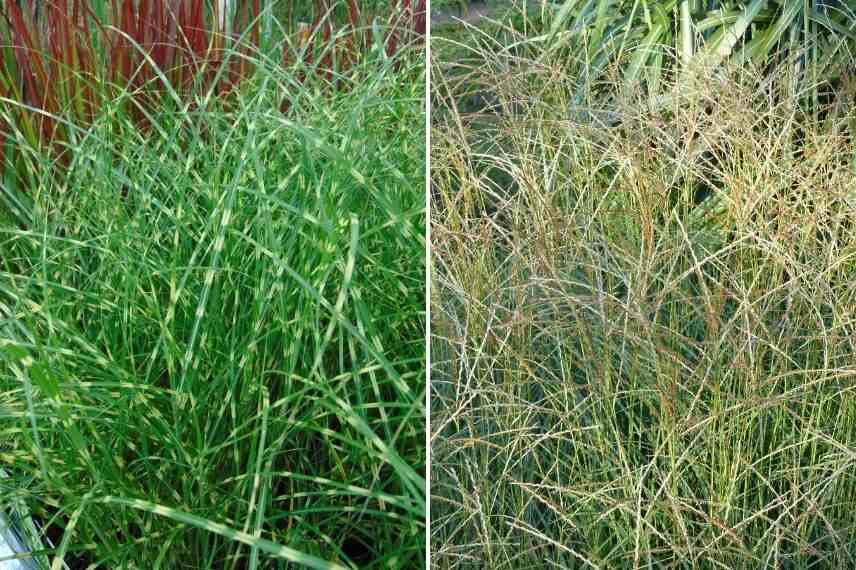
Miscanthus sinensis ‘Little Zebra’ and Miscanthus sinensis ‘Cute One’
Discover other Perennials
View all →Available in 0 sizes
Available in 1 sizes
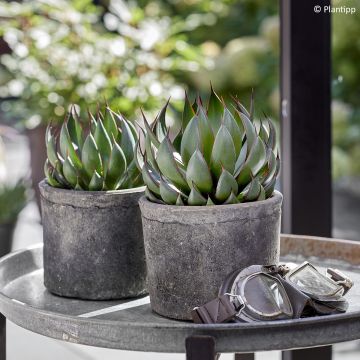
Available in 1 sizes
Available in 1 sizes
Available in 1 sizes
Available in 1 sizes
Available in 2 sizes
Available in 1 sizes
Available in 1 sizes
Available in 1 sizes
Buenos Aires Verbena, a stunning flowering for the balcony
The Buenos Aires Verbena is a perennial that offers an explosion of purple flowers from late spring to autumn. These are grouped in very airy panicles, which have the advantage of being melliferous and attracting numerous pollinators.
The foliage persists in mild winters.
With a very natural and rustic appearance, it is a low-maintenance plant. Hardy down to -10 to -15 °C, it also tolerates drought. Its light growth withstands winds, in which it will sway gracefully. Note that while its lifespan is short, it has the advantage of self-seeding.
While the typical variety is quite imposing, reaching heights of 1.5 to 2 metres, there are dwarf varieties, such as the lovely Verbena bonariensis ‘Lollipop’. Perfect for pot cultivation on a balcony or terrace, as its compact silhouette does not exceed 60 cm in all directions.
Provide it with a sunny location in well-drained soil.
To learn everything about cultivating this perennial, read our article “ Verbena: planting, pruning, and care .”
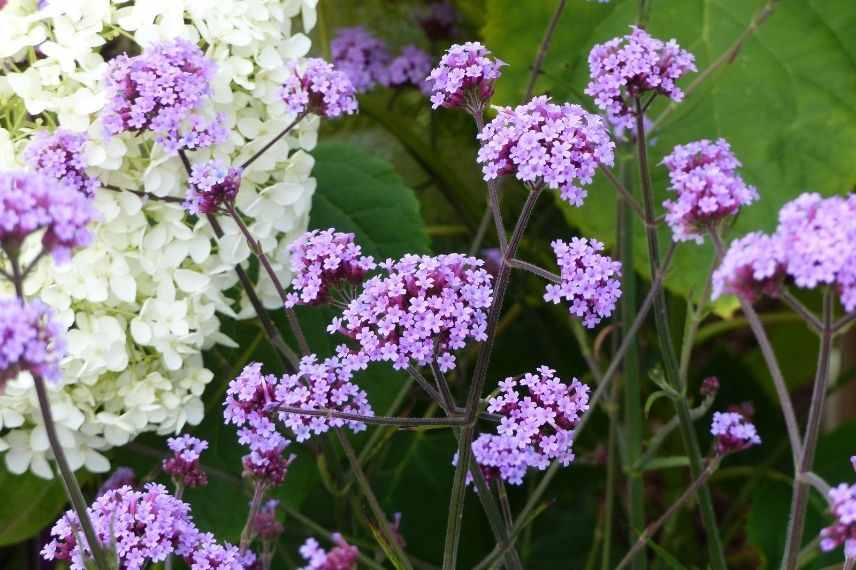
Verbena bonariensis ‘Lollipop’
The Helianthemum, a perennial resistant to sea spray
The Helianthems, whose Latin name translates to ‘Flower of the Sun’, are perennial undershrubs commonly found in scrublands. They are cousins of the cistus, resembling them in a dwarf form.
What are their advantages? Hardiness down to about -15 °C, resistance to drought, lime, and sea spray, and great ease of cultivation.
They offer abundant flowering from spring to autumn, adorned with light flowers that are continuously renewed, featuring slightly crumpled petals. The colour palette ranges from yellow to red, including white, pink, or bi-coloured. The foliage can be evergreen or semi-evergreen, green or silver.
Grow helianthems in pots in a sunny position, in well-drained soil, on a balcony or terrace by the sea.
Find more details in the file “Helianthem: planting, growing tips” and the article “Growing a helianthem in a pot.”
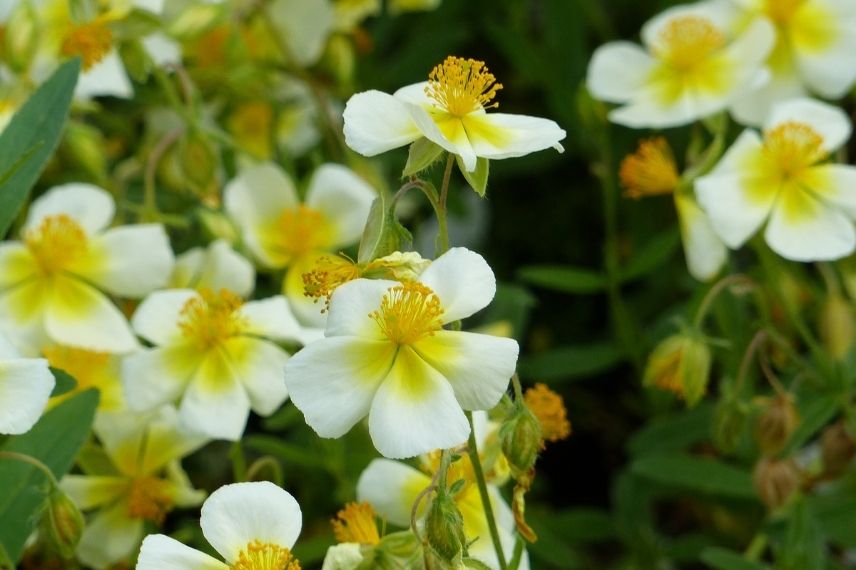
Helianthemum ‘Elfenbeinglanz’
Achillea: colourful flowers for all tastes
The Achilleas are perennial plants valued for their beautiful and abundant summer flowering, which comes in many colours.
Easy to grow, robust, undemanding, hardy, drought-resistant, and tolerant of coastal winds, they adapt to all our regions. To top it off, this plant is also melliferous, edible, and renowned for its natural properties. On the balcony, the achillea will bring a light, colourful, country-style touch.
Opt for varieties of small dimensions with a compact habit. Their reduced size will allow them to withstand gusts and assaults from even strong winds. The Achillea millefolium ‘Apricot Delight (Tutti frutti)’ (60 cm in all directions) offers flowers that transition from pink to pale apricot before fading to red. ‘Desert Eve Red’ (40 cm in all directions) features large umbels of brick-red flowers with a golden yellow centre. As for Achillea (x) clypeolata ‘Little Moonshine’ (just 30 cm in all directions), it produces corymbs of sunny, bright yellow flowers.
Provide them with a sunny exposure, in even poor and dry soil.
Find all our growing tips in the dedicated section “Achilleas: planting, growing, and maintaining.”
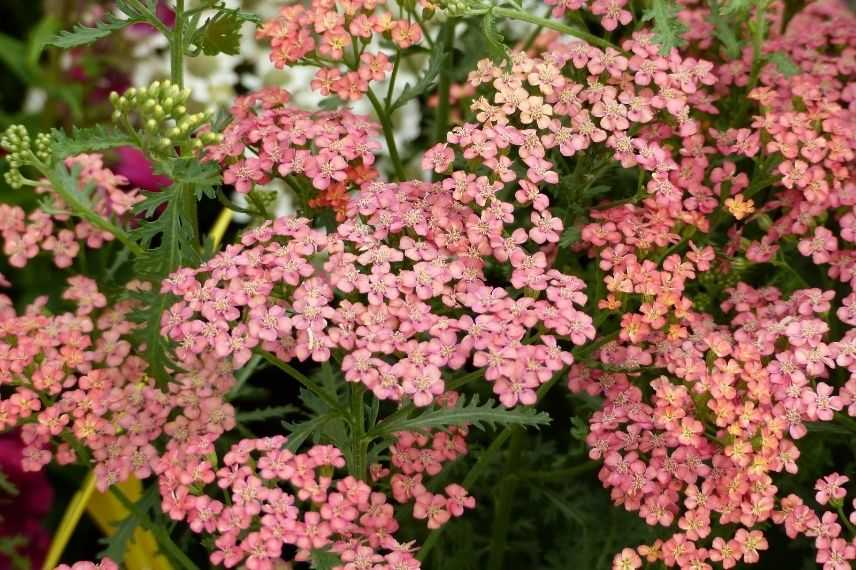
Achillea ‘Apricot Delight’
Saxifrage, a montane plant with great resilience
The Saxifrages are small rock garden perennials. These plants, primarily originating from mountainous areas, are accustomed to harsh conditions to which they have adapted to survive: cold, strong winds, drought, large temperature fluctuations within hours, poor soil, etc.
The flowering occurs in white, pink, or red stars between spring and early autumn, depending on the variety. The plant then transforms into a vibrant flowering cushion. Most saxifrages have evergreen rosette foliage, which remains decorative even in winter.
They are ideal for creating a lovely sunny pot on the balcony. Saxifrages will thrive even with minimal substrate, in a container mixing light soil and gravel. For example, consider the mountain saxifrage Saxifraga cotyledon ‘Southside Seedling’ (50 cm in height and 30 cm in spread), with its white flowers beautifully speckled with red.
Feel free to also check our section on “Saxifrages: planting, cultivation, and maintenance.”
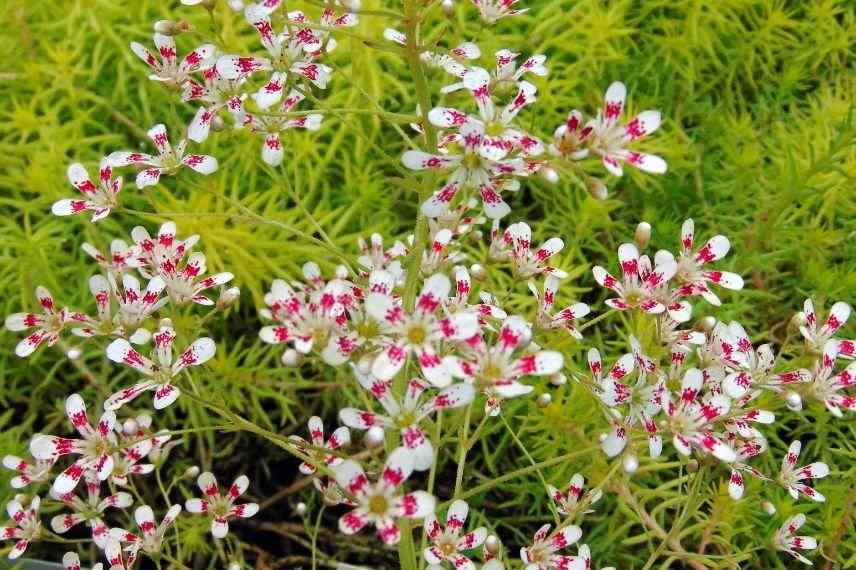
Saxifraga cotyledon ‘Southside Seedling’
- Subscribe!
- Contents
































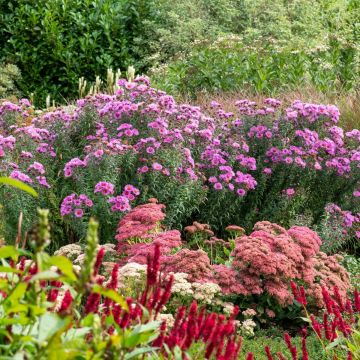
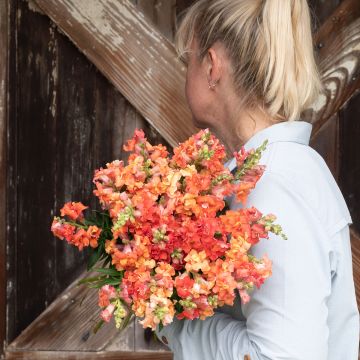
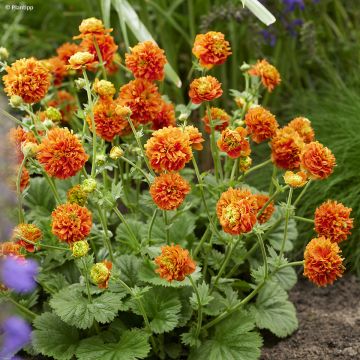
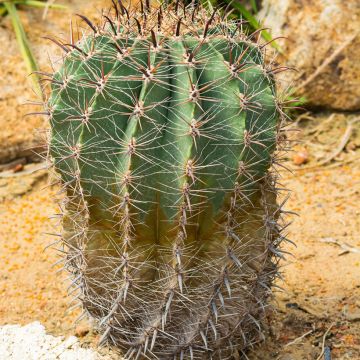
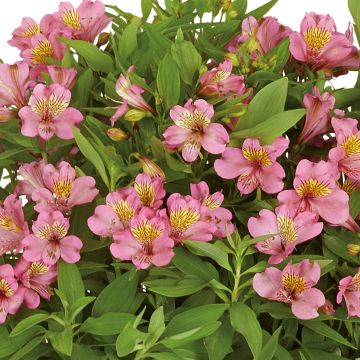
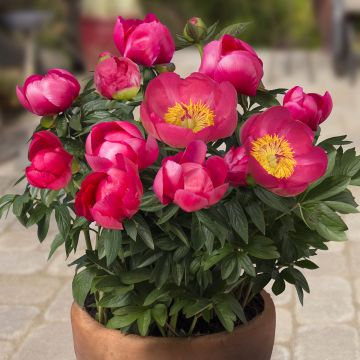
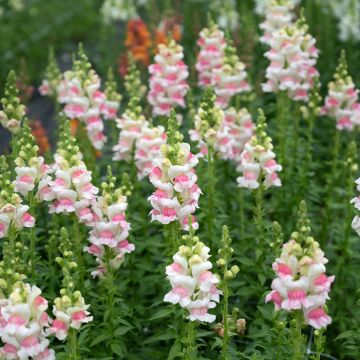
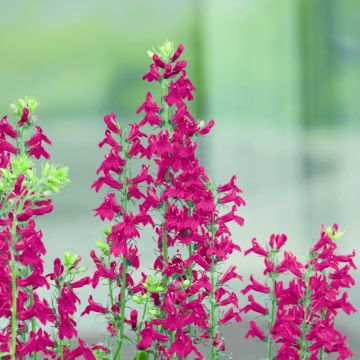
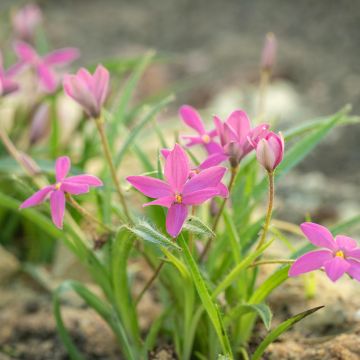
Comments